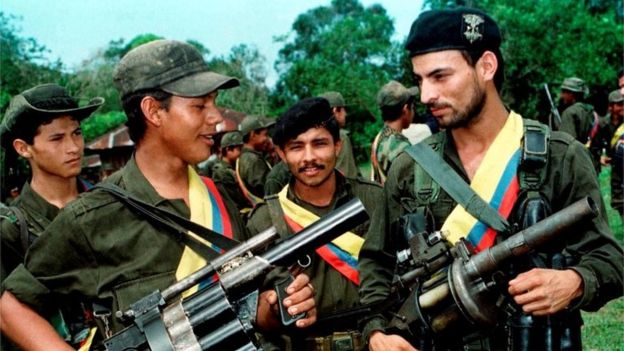Colombia FARC Rebels Announce Ceasefire Ending Over 50 Years of Fighting
NEW DELHI: The main leftist rebel group in Colombia, the FARC, has ordered all its fighters to observe a ceasefire from midnight local time (05:00 GMT Monday). The ceasefire brings to a definitive end the group’s 52 year long war.
FARC leader Rodrigo Londono, known as Timoleon Jimenez or Timoshenko, gave the order to stop firing. "Never again will parents be burying their sons and daughters killed in the war,'' Timoshenko told journalists. "All rivalries and grudges will remain in the past," he added.
Colombian President Juan Manuel Santos signed a decree earlier to halt military operations against the FARC, also in effect from midnight. "One of the country's most painful chapters" is coming to an end, Santos said in a tweet on Sunday, adding that the ceasefire was a “historic step.”
The two sides reached the historic deal last week. It took over four years to conclude and will be put to a referendum on October 2 before it is implemented. As per the deal, the rebel group will put down their weapons and reintegrate to civilian life. The two sides had signed a ceasefire in June, paving the way for the deal.
"The Colombian government and the FARC announce that we have reached a final, full and definitive accord ... on ending the conflict and building a stable and enduring peace," the two sides said in a joint statement. "We don't want one more victim in Colombia."
Santos -- who was re-elected in 2014 based on the premise of a peace deal -- addressed the nation soon after the announcement. "Colombians: the decision is in your hands. Never before have our citizens had within their reach the key to their future,” the President said. "Today I can say - from the bottom of my heart - that I have fulfilled the mandate that you gave me."
Lead FARC negotiator Ivan Marquez said of the deal following its announcement, “We have won the most beautiful of all battles… The war with arms is over, now begins the debate of ideas."
Reports indicate that the deal covers six key agreements: justice for victims of the conflict, land reform, political participation for ex-rebels, fighting drug trafficking, disarmament and the implementation and monitoring of the accord.
Once implemented, FARC will move its fighters out of the jungles and mountains into disarmament camps set up by the United Nations. The weapons being used by its fighters will be melted down to build three peace monuments. FARC will then become a political party.
As for crimes committed, special courts will be set up to look into the matter. An amnesty will be granted for less serious offenses, however, it will not cover the more serious atrocities including massacres, torture and rape. Those convicted of these offenses will face up to 20 years in prison, with the possibility of a lesser sentence if they confess.
Most opinion polls suggest that Colombians at large will back the deal.
However, resistance remains as many in Colombia believe that the only closure to the decades of war at the hands of FARC is to finish the rebel group entirely. The provision that allows FARC to become a political party, therefore, may prove to be a contentious one.
More than 220,000 people were killed in the war, and hundreds of thousands of others were displaced. The war began in 1964 when FARC took up arms to fight against entrenched social and economic inequalities, and were funded in large part by the booming cocaine trade. The group came to control large parts of territory, but were beaten back significantly in the early 2000s.
(Cover Photo: Photo of Farc guerrilla fighters posing with their weapons after a patrol in the jungle)





